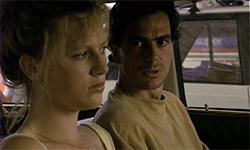The Vanishing (Spoorloos) [Blu-Ray]
|
 (Warning: The Vanishing has one the most justly famous endings in recent cinema, and as it is difficult to fully discuss the film's merits without mentioning what it is, I recommend that anyone who has not seen the film and does not want the ending given away stop reading now.)
(Warning: The Vanishing has one the most justly famous endings in recent cinema, and as it is difficult to fully discuss the film's merits without mentioning what it is, I recommend that anyone who has not seen the film and does not want the ending given away stop reading now.)
Most horror movies generate terror in the viewer by defying rationality. It should come as little surprise that the two canonical novels that laid the groundwork for the modern horror genre—Mary Shelly's Frankenstein and Bram Stoker's Dracula—were both written during the 19th century when Enlightenment ideals of scientific rationality and logical thought were reaching their height with the advent of secular modernism. Horror is a direct response to just such thinking; it frightens by giving power to the irrational. The vampire, the werewolf, and other supernatural beings defy the rational by their very existence. Serial killers and slashers defy the rational by murderously negating the value of human life. And mad scientists pervert the very mode of rationalistic thought that made them scientists in the first place. At every step in the horror genre, the rational fails in the face of the horrific, and the monster is often defeated only when its victims become monsters themselves. George Sluizer's masterful The Vanishing (Spoorloos), a mystery-thriller with horror overtones, goes in a completely different direction. It doesn't defy rationality, but rather turns rationality itself into an instrument of horror. The film's monster, a seemingly harmless professor of science, does not commit evil acts because of some inherent nature or uncontrollable urge. Rather, he commits them for the worst reason of all: Because he can. The Vanishing is perhaps most disturbing in how it depicts the methodical, exacting nature of evil. It is trained and practiced, thought out and rehearsed. Based on the novel The Golden Egg by Tim Krabbé, The Vanishing opens with a young Dutch couple, Rex Hofman (Gene Bervoets) and Saskia Wagter (Johanna ter Steege), on a cycling holiday in France. It is apparent early on that this trip constitutes a major step in their relationship, and Sluizer brings us immediately into identification with them as they fight, make up, and prepare for the rest of the trip ahead of them and their unknown but hopeful future together. They stop off at a large gas station. Saskia goes in to use the restroom and comes out with a Frisbee. They throw it around, talk, and bury two coins beneath a tree to mark their having been there together. She goes back into the gas station to buy drinks before they finish the last leg of the trip ... and never comes back. Rex wait and waits and waits, looks for her in the gas station, asks if anyone has seen her, and finally begins to panic when he realizes that she is gone. The police think it is a domestic squabble; maybe she got fed up and left him. The film then takes an enormous risk by leaving Rex at the height of his distress and allows us to see the perpetrator of Saskia's abduction, Raymond Lemorne (Bernard-Pierre Donnadieu), a banal-looking member of the French middle class. He has a wife and children, a good job, and material comfort. Yet, past that thin surface, he is a methodical, precise, amoral man of science who has been planning to abduct a young woman for some time just to see if he can. Disturbing as it is, Sluizer and Krabbé present Raymond's intricate planning process with a sense of the blackly comical; we like to think of evil deeds as being sudden and inexplicable, but this one is the result of endless, dull planning with stopwatches and practice runs. Sluizer then brings the two characters together by jumping forward three years and showing that Rex, although he has a new girlfriend, is still obsessed with Saskia's vanishing. He is no longer in love with Saskia, but he simply cannot stand the idea of not knowing. His obsessive desire to know what happened to her parallels Raymond's obsessive planning of the deed—they are linked by their compulsions. Rex's desire to know exactly what happened to Saskia essentially overwhelms any other feeling he has, including fear. It is a desire run rampant, out of proportion with its potential to be fulfilled. He says, if given the choice, he would let Saskia die if it meant he would know what happened, and this is given a cruel, ironic twist in the end when he and Raymond finally come face to face and Rex consciously chooses his own death (or least chooses to risk that fate) in order to find out. The Vanishing is a masterful thriller, and its unique status is underlined by Sluizer's ill-fated decision to remake his own film for an American studio in 1993. Starring Kiefer Sutherland and Jeff Bridges, the remake of The Vanishing, with its awkward and tacked-on happy ending, highlights everything that is brilliant and disturbing about the original. Sluizer's original film is an unrelenting meditation on the link between fear and desire, with the latter becoming disastrously overwhelming. Its bleak ending is gut wrenching, yet the film is unthinkable without it, especially in what it says about both Rex's overwhelming urge to know and Raymond's carefully disguised sociopathic character. The first time I saw the film, I somehow hadn't caught on to the connection between Raymond's throwaway revelation of his claustrophobia and his method of murder. I made the connection when he says to Rex in the car that death wasn't enough, he had to find something worse for Saskia. When he tells the police officer that he's not wearing his seatbelt because he's claustrophobic, it suddenly became obvious why he buried his victims alive: It was his version of a fate worse than death. After all, what could possibly be more threatening to someone inherently afraid of closed spaces? Thus, the film does an interesting twist on the monster by allowing him to inflict his own horror on others. While the monster usually functions as an abstract being to make physical our own latent fears, here we are allowed into the monster's mindset and what he fears, which is the most disturbing and terrifying place of all.
Copyright ©2014 James Kendrick Thoughts? E-mail James Kendrick All images copyright © The Criterion Collection | |||||||||||||||||||||||||||||||||||
Overall Rating:



 (3.5)
(3.5)
Subscribe and Follow
Get a daily dose of Africa Leader news through our daily email, its complimentary and keeps you fully up to date with world and business news as well.
News RELEASES
Publish news of your business, community or sports group, personnel appointments, major event and more by submitting a news release to Africa Leader.
More Information
